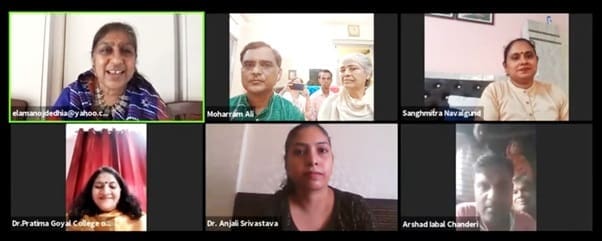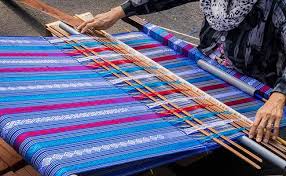Dr Ela Dedhia, Head Department of Textiles & Fashion Technology, College of Home Science Nirmala Niketan, Affiliated to University of Mumbai, India
A National talk show on Handloom Woven Fabric – Story Of Banarasi Brocade And Chanderi, was held on National Handloom day 7th August, 2020 from 11:00 am to 12:30 pm by the Department of Textile and Fashion Technology of College Home Science, Nirmala Niketan, Affiliated to University of Mumbai, NAAC Accredited A Grade. Delegates included students, teachers, professionals, craft lovers, artisans and others related to this field at National and International level.
Dr. Ela Dedhia, Head of Department of Textile and Fashion Technology, gave an overview of the theme of the webinar. Due to the lack of exposure and awareness, people are not directly connected to handloom weavers and because of which weavers have been facing a lot of difficulties in marketing and selling their products. The main motto of the webinar was to have direct talk with handloom weavers and connecting them directly to potential customers, entrepreneurs and other field related professionals who can help the weavers through purchases or otherwise.
Dr Dedhia moderated the session including the questions raised by participants on YouTube.
Along with Dr Dedhia on the organizing committee included Dr. Pratima Goyal, Dr. Vishaka Karnad, Dr. Ritu Madhan, Ms. Neha Mulchandani, Ms. Vrinda Udiaver, Dr. Anjali Srivastav, Ms. Sanghmitra Navalgund and Ms. Vibhuti Khedekar. Edfly was the Technical partner and Textile Value Chain was the Media Partner. Ms. Sanghmitra Navalgund proposed the vote of thanks. The webinar was conducted through online video platform and telecasted on YouTube for the audience. The Video is available on YouTube.com/TFTNN.
There were two handloom weavers during the webinar.
Moharram Ali, Alias Hasham Turabi, a Banarasi Brocade handloom weaver from Banaras in Uttar Pradesh, India who is also a poet and an innovator. Mr. Alias Ali started by introducing himself as requested by Dr. Ela Dedhia. The introduction was very unique and sweet in shayrana andazz by Mr. Ali goes as
“Badlav ne Duniya Ka Badal Dala Sabhi Kuch,
Kayam Hai magar Ab bhi Vahi Shahane Banaras,
U hin Nahi Le jate hain Sab Sadi Yahanki,
Mashoore Zamana Hai Ye Samane Banaras”
He along with his family are in this profession since seven generations. His motto is to help the weaver community by directly connecting weavers to customers without any middle men and also help customers by providing them authentic products. He also spoke on the history of Banaras brocade fabrics tracing back from the era of Bhagwan Buddha. He also talked about an innovation done by him on “Banarasi Portable Mini Jacquard Handloom” which is created and patented by him. The handloom is pit less with size of 15” by 36” and the length of Jacquard is 9”. The loom was created to help students to get practical knowledge of weaving. Mr. Ali showed some masterpieces from his collection which included traditional

sarees, stoles, bed sheets, pillow covers, cushion covers, and wall hangings which were created by him and his family. Products are created based on customers demand. Mr. Ali answered satisfactorily, all the questions raised by the participants on the YouTube.
The second weaver was Arshad Iqbal, a Chanderi handloom weaver from a very small village Chanderi in Madhya Pradesh, India. Mr. Iqbal introduced himself and explained how he along with his family are in this profession from 10 generations. More than 500 weavers are connected with chanderi weaving and in their village there are more than 90 handlooms. There is no power loom in the entire village. Every house in the entire village will have atleast one handloom. The working system in the village is such that 6 days in a week the weavers weave sarees and on the 7th day they get their payment reimbursed from Master weaver/Trader. The unique feature of chanderi weaving is that it is lightweight and has a sheer texture with luxurious feel. They also make sarees and stoles as per customers demand. They can create saree with human portrait and they are capable of weaving almost any motifs. Mr. Iqbal showed some masterpieces from his collection which included traditional sarees, stoles, and fabrics which were created by him and his family. He also showed a saree which was worn by famous celebrity actress Anushka Sharma.

Dr. Ela Dedhia asked both the weavers the opportunities and challenges that they have come across during the lockdown period. On this Mr. Alias Ali said that the price of raw materials was almost doubled from before and many of the weavers started doing other work such as selling vegetables, driving auto rickshaws, etc. and Mr. Arshad Iqbal said that from past 4-5 months not a single product is sold but weavers are making the sarees although they are not able to pay them appropriately. Basic survival has also become very difficult for many weavers. They don’t have any mode to sell their product internationally or digitally.
This webinar gave in-depth information about crafts, and also about the situation the craftsmen are facing currently due to Pandemic and it showed the way by which students, new entrepreneurs and designers can work together with artisans to help them tackle their challenges. There is a huge opportunity to grow with the artisans and also overcome the problems they face.
Dr. Ela Dedhia and many other participants were encouraged to help them in this situation and as suggested by them both the weavers were ready to sell their products through online platforms. Both the weavers and all the participants on YouTube were very happy and sent several messages through the YouTube live chat saying that they are feeling very fortunate that from the comfort of their home, they are able to observe and enjoy such kind of rich crafts and they were very thankful to the organising team. The session ended by meeting the family members of weavers and some online photography through screenshots to cherish these beautiful memories.


